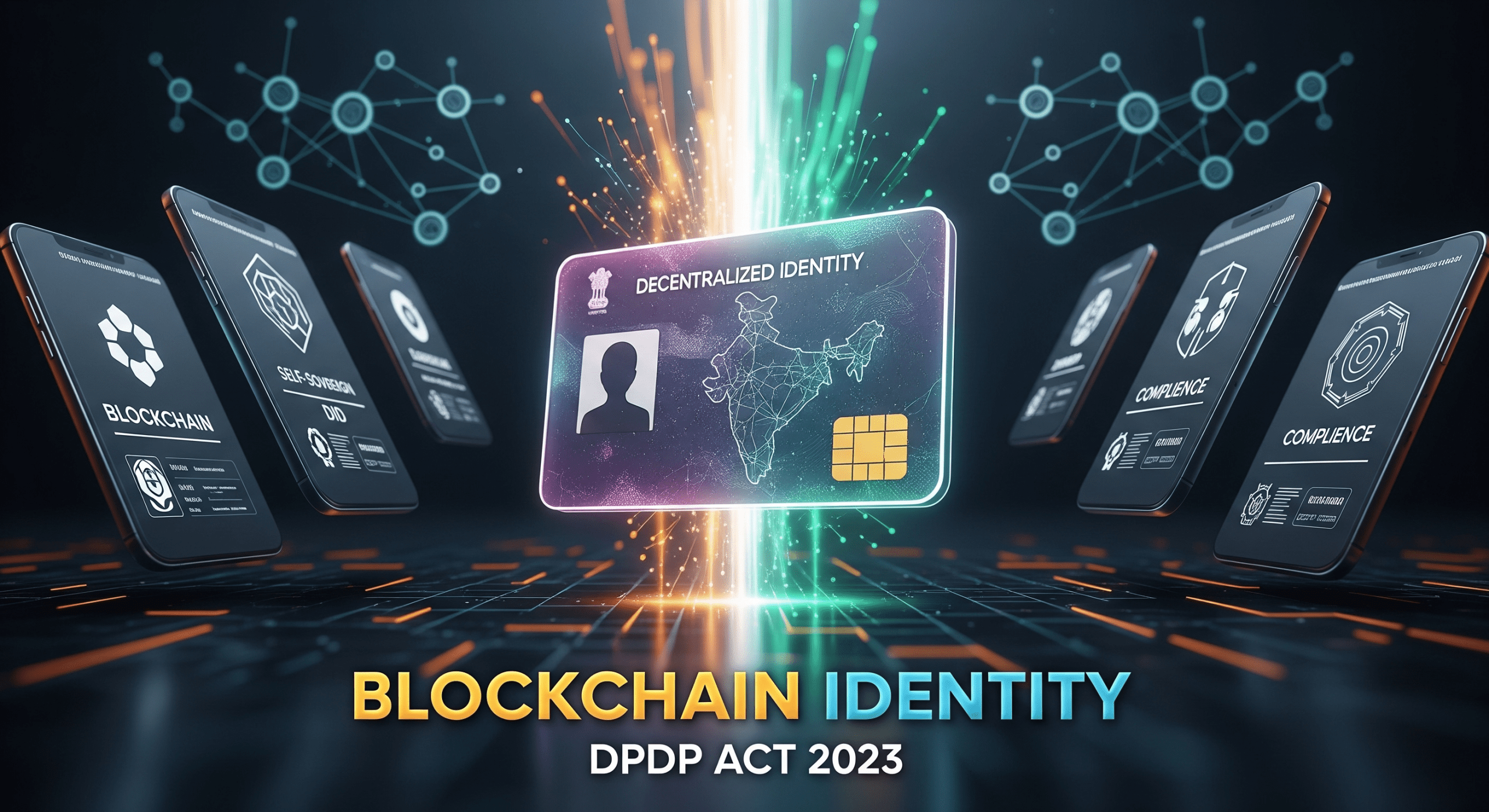Blockchain
5 months ago
The Role of Blockchain-Based Decentralized Identity (SSI/DID) in India’s DPDP Act
Introduction
As India advances its digital economy with the Digital Personal Data Protection (DPDP) Act, 2023, managing personal data securely and transparently has become paramount. Blockchain-based decentralized identity systems, including Self-Sovereign Identity (SSI) and Decentralized Identifiers (DIDs), are emerging as transformative technologies that align naturally with DPDP’s principles of user control, privacy, and consent.
This blog explains how blockchain-powered decentralized identity solutions empower individuals, enhance compliance, and support enterprises navigating DPDP. Drawing from current technological trends and regulatory insights, we show why SSI/DID is not just an innovation but a critical enabler for India’s data protection framework.
What Is Decentralized Identity and Self-Sovereign Identity?
- Decentralized Identity (DID): DID is a new identity management paradigm allowing individuals to possess unique digital identifiers that are fully under their control, without relying on centralized authorities. These identifiers are secured on blockchain or distributed ledgers.
- Self-Sovereign Identity (SSI): SSI is a concept within decentralized identity emphasizing privacy and user empowerment. Individuals control their own digital credentials and selectively disclose verified information when needed, rather than sharing entire identity profiles.
By shifting control from central providers to individuals, these technologies enable users to manage their digital identities and personal data securely, reducing risks of data breaches and identity theft.
How Blockchain-Supported SSI/DID Aligns with DPDP Act Principles
1. Enhanced User Control and Privacy
SSI/DID platforms let users selectively share only the minimum required personal information for transactions or verifications, supporting DPDP’s data minimization and purpose limitation rules. For example, verifying age for liquor purchase can be done via a simple cryptographically verified claim without revealing other personal data.
2. Immutable and Tamper-Proof Audit Trails
Blockchain’s decentralized ledger ensures that identity-related actions and consents are recorded immutably. This aligns with DPDP’s emphasis on maintaining verifiable consent records, supporting strong regulatory auditability.
3. Fine-Grained Consent Management
Smart contracts in blockchain networks can enforce capabilities-based access control, giving users the ability to grant or revoke consent to specific data usages with precise temporal and contextual restrictions. This power enhances compliance with DPDP’s granular consent requirements.
4. Privacy-Preserving Cryptography
Techniques such as Zero-Knowledge Proofs (ZKPs) enable users to prove facts about their identity (e.g., citizenship, eligibility) without sharing underlying sensitive data, supporting DPDP’s privacy standards in digital interactions.
5. Reduced Reliance on Centralized Identity Providers
SSI/DID frameworks limit single points of failure and reduce risks inherent in centralized databases. Decentralized identity models empower citizens and businesses while ensuring resilience and security, echoing DPDP’s intent to decentralize data sovereignty.
Practical Use Cases in India
- Government-issued Digital Credentials: Issuing digital identity proofs and certificates on blockchain that citizens can control and share securely without risking mass data exposure.
- Financial Services & KYC: Banks and CEXs can leverage SSI for secure, reusable KYC credentials, cutting redundant data collection and complying with DPDP by recording immutable consent.
- Healthcare: Patients can share verified health credentials on-demand while maintaining data privacy and consent management under DPDP protocols.
- E-Governance and Service Delivery: Citizens can interact with public services through privacy-preserving verifiable credentials, reducing fraud and increasing transparency.
Challenges and Considerations
- Regulatory Recognition: Legal frameworks need to formally recognize decentralized identifiers and verifiable credentials as valid proofs under DPDP.
- Interoperability and Standards: Collaboration among government bodies, technology providers, and standards organizations is critical to ensure seamless SSI/DID adoption across platforms.
- Scalability: Handling India’s massive digital population requires blockchain networks that can scale securely and efficiently.
- Right to Erasure vs Immutable Ledgers: Designing off-chain data storage and selective disclosure mechanisms is necessary to reconcile immutable blockchain records with DPDP’s rights like “right to erasure.”
The Role of eAdhikar and Blockchain in DPDP Compliance
eAdhikar, a blockchain-native consent management platform, exemplifies how the benefits of SSI/DID can be realized in practice:
- Employs blockchain to securely record user consents and digital interactions immutably.
- Uses smart contracts to automate enforcement of consent terms and access control.
- Supports multilingual user dashboards empowering individuals to manage consent.
- Integrates smoothly with enterprise systems to align with DPDP’s compliance mandates.
By combining decentralized identity principles with blockchain’s transparency and automation strengths, eAdhikar offers enterprises a powerful tool to prepare fully for DPDP compliance while fostering user trust and operational efficiency.
Conclusion
Blockchain-based decentralized identity technologies like SSI and DID are not just futuristic concepts but essential enablers for India’s DPDP Act’s vision of privacy, user empowerment, and data protection. They help transform consent management and identity verification from centralized, vulnerable processes into secure, user-driven digital experiences.
Enterprises, governments, and technology providers must collaborate to overcome regulatory and technical challenges to unlock SSI/DID’s full potential in India’s vast digital ecosystem. Platforms like eAdhikar are already paving the way, blending blockchain’s immutability with user-centric consent management to operationalize DPDP in today’s world.
Adopting decentralized identity is critical not only for compliance but to build the foundation of a trustworthy, privacy-respecting digital India.

